rOpenSci submissions
Checking rOpenSci review process
Following last post on Bioconductor I wanted to analyze another venue where code reviews are made: rOpenSci. There are some other analysis of the the reviews made by rOpenSci themselves:
The first post in the series will explain how I rectangled onboarding. The second post will give some clues as to how to quantify the work represented by rOpenSci onboarding. The third and last post will use tidy text analysis of onboarding threads to characterize the social weather of onboarding.
rOpenSci review process has some of the differences:
One can ask before hand if the package submitted fits the scope of rOpenSci. In addition the review is done by two volunteers usually not affiliated with rOpenSci but with an editor that has the final decision Also there is an encouragement on a dialog and iteration to improve the package. Lastly, the build process is perform by third parties (Github actions, travis, appveyor …) and the results are not reported on the issue.
Despite all these differences following the same methods I downloaded the data on 2020/09/02 to analyze similarly the submissions.
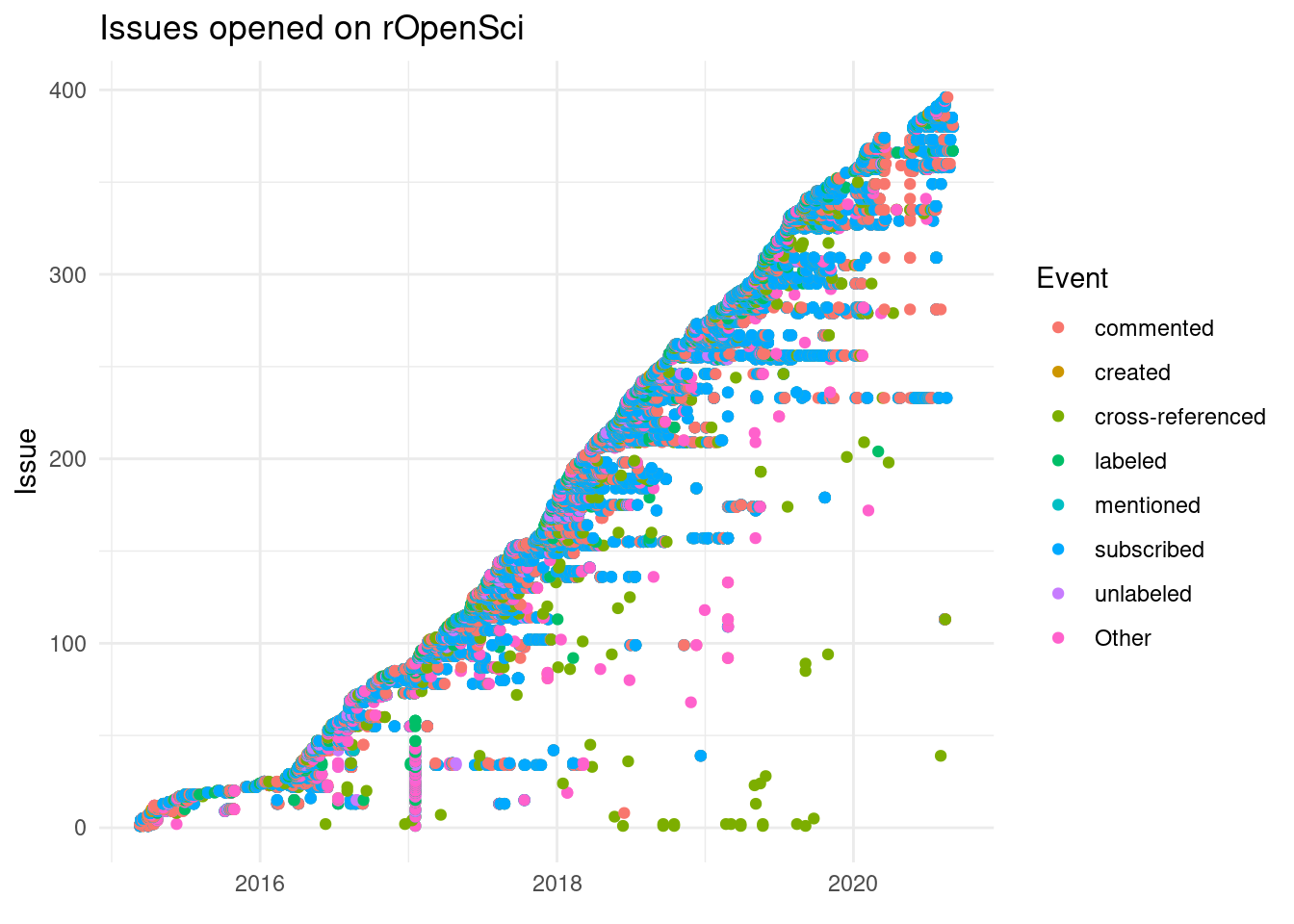
We can see that there are fewer issues opened on rOpenSci but also the timeline is shorter. One difference is that there seems to be more events after the initial activity on the issues.
If we look at the editors involved on the issues we can see who has commented more and in more issues
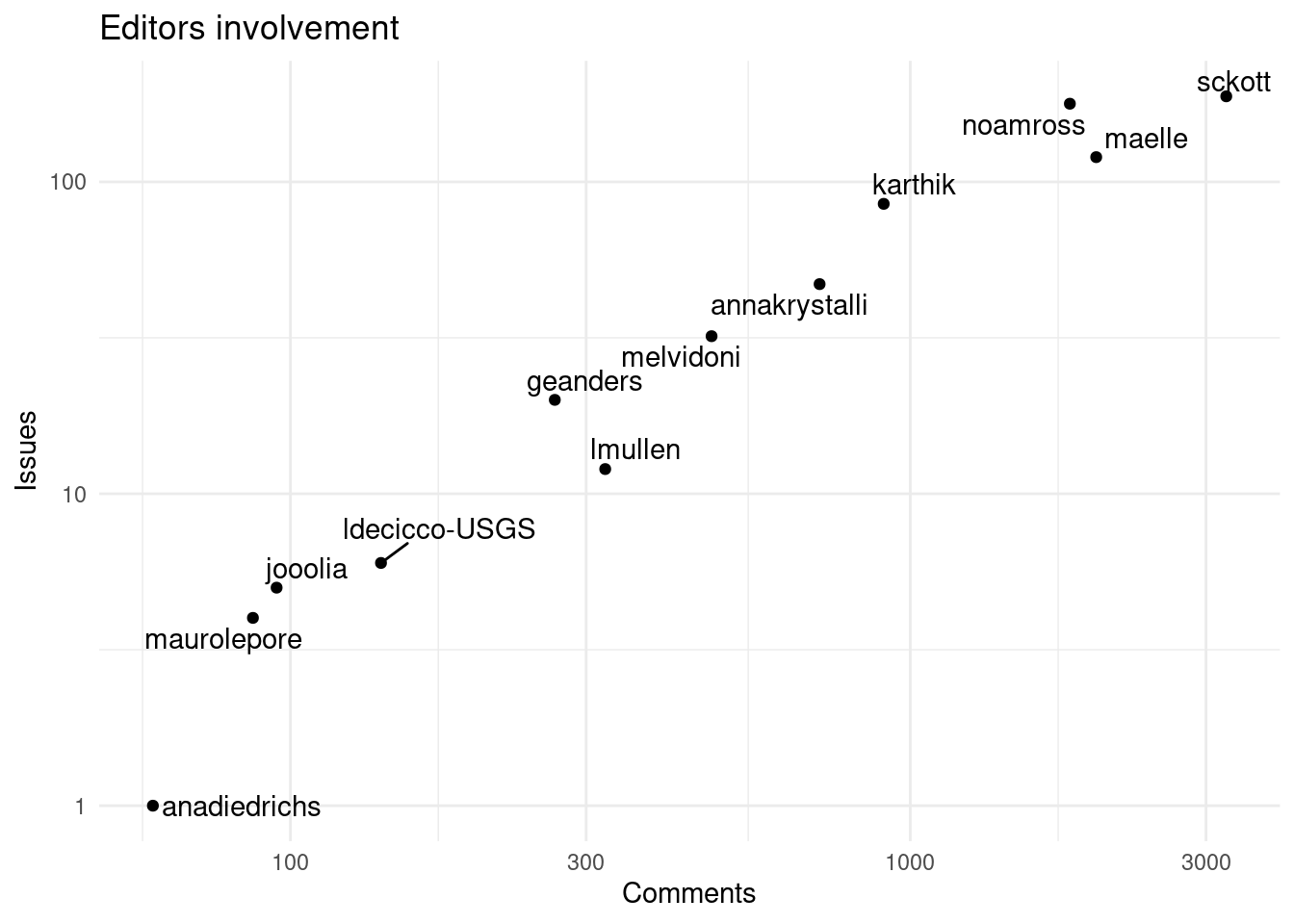
It seems like there are 10 comments per each issue an editor is involved with. Of course, this will change for people submitting software:
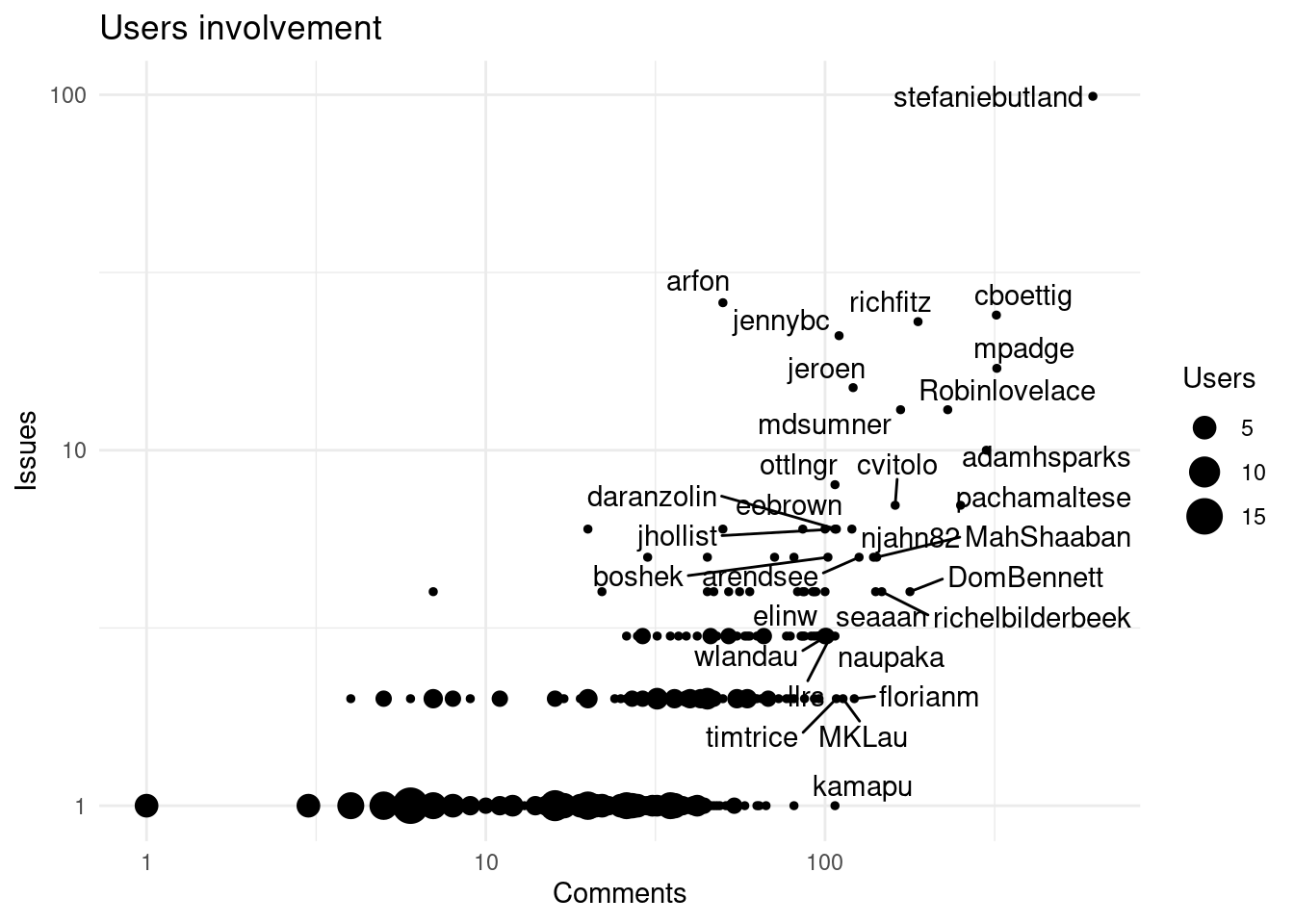
Here I kept the same threshold to show the names of users. There are more names, indicating more people commenting and involved on the issues. I’m surprised to appear on this graph because I haven’t been much involved with rOpenSci. Stefanie Butland as the community manager of rOpenSci comments more and is involved in more issues than regular users.
Now that we know who is involved comenting, what about the other events?
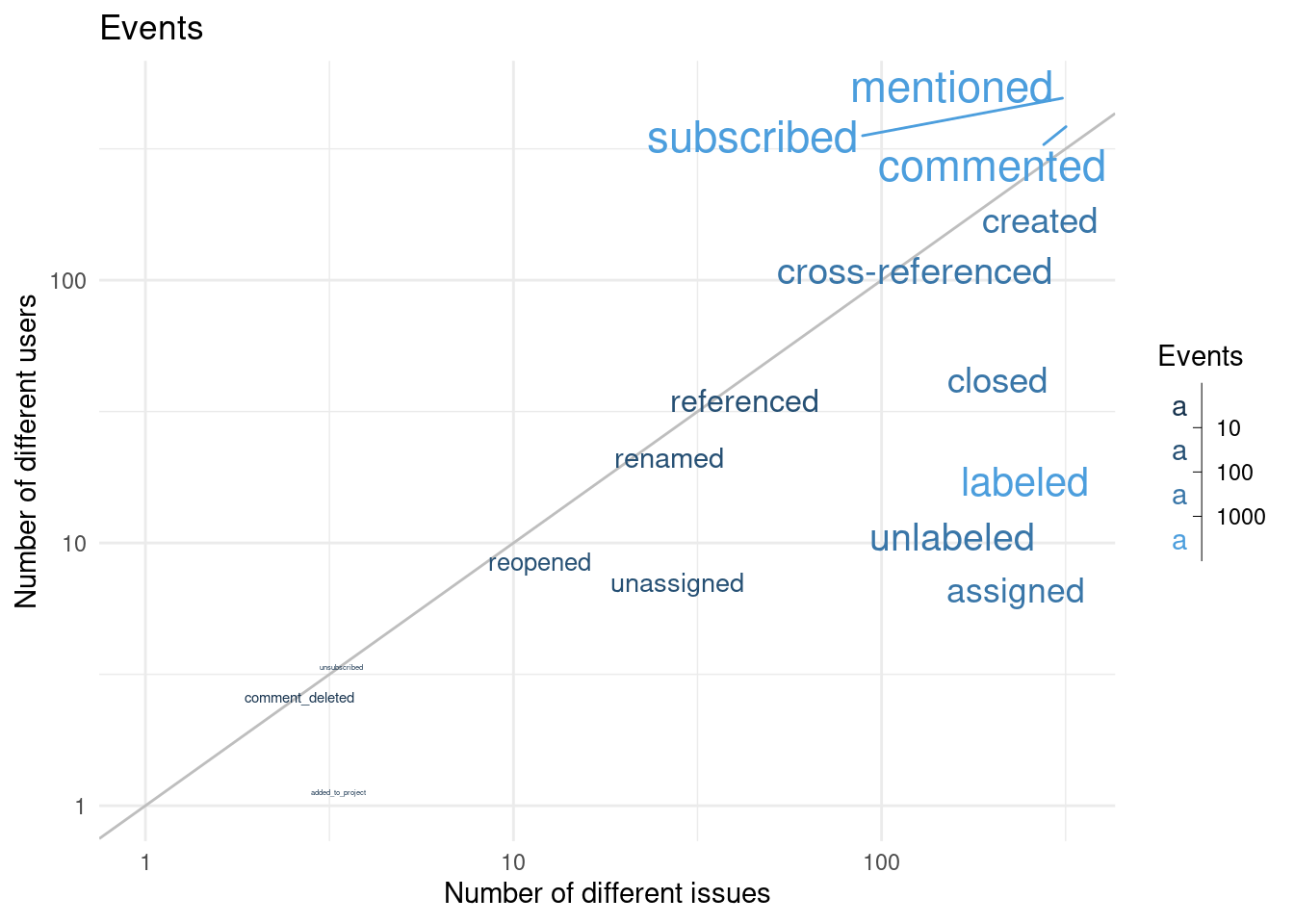
First thing, more people are mentioned between them than on Bioconductor. Also there seems to be a lot more of cross-references than on Bioconductor.
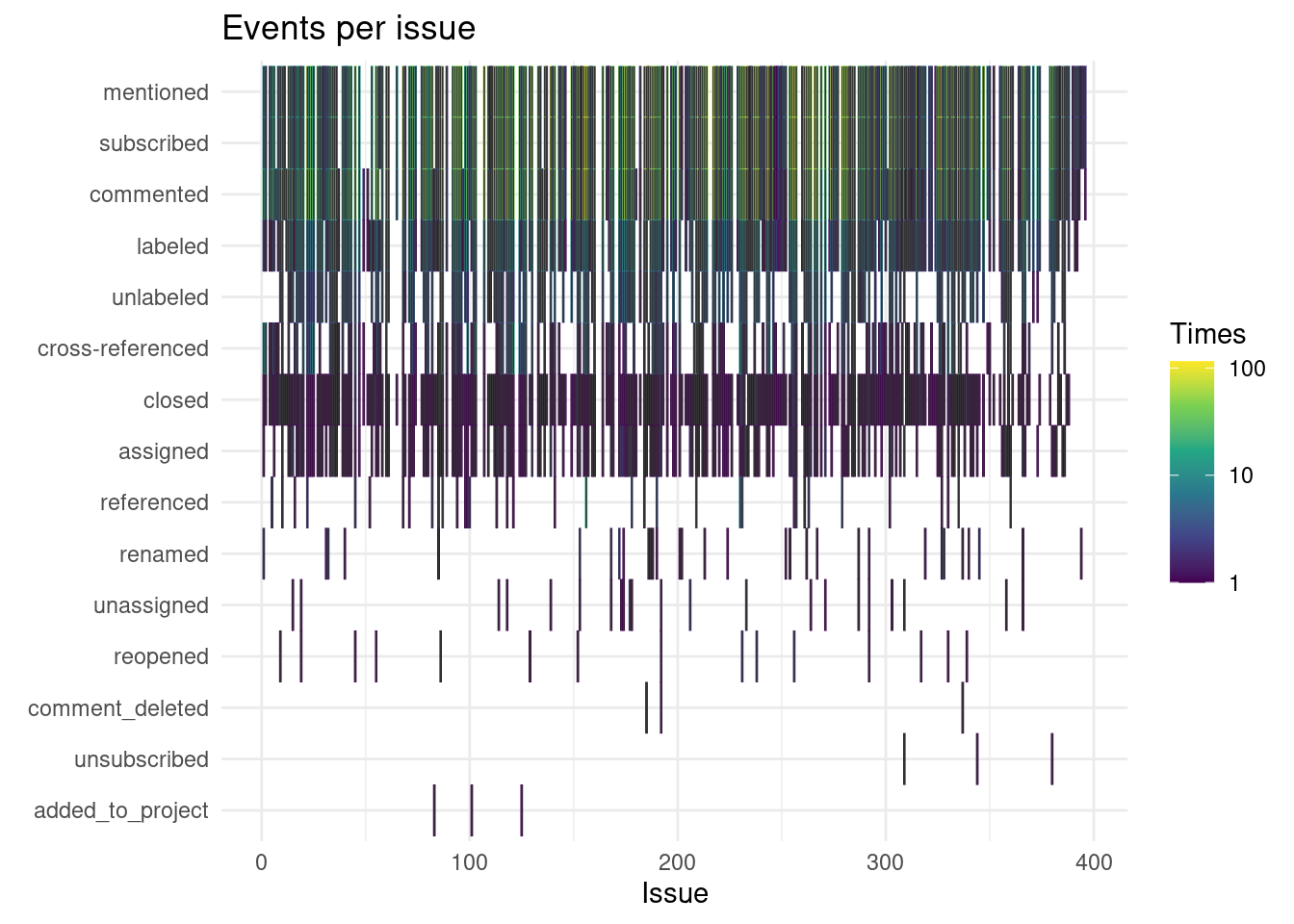
The issues do have a highly social component with lots of mentions, subscriptions and comments. It is generally rare to unsubscribe from an issue or to have the issue added to a project.
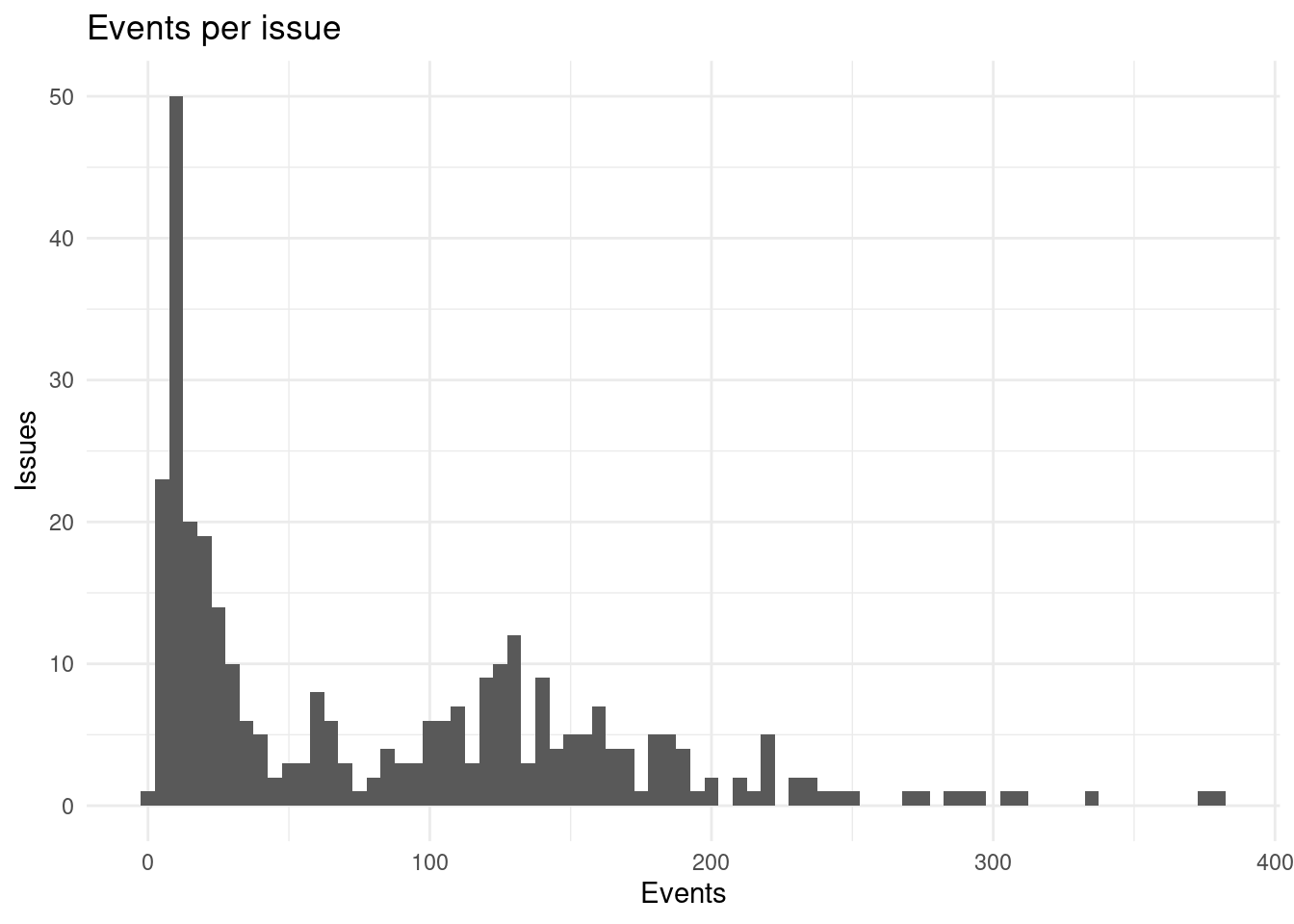
Here we don’t see a clear pattern on the events, but most issues have few events (median events of 61).
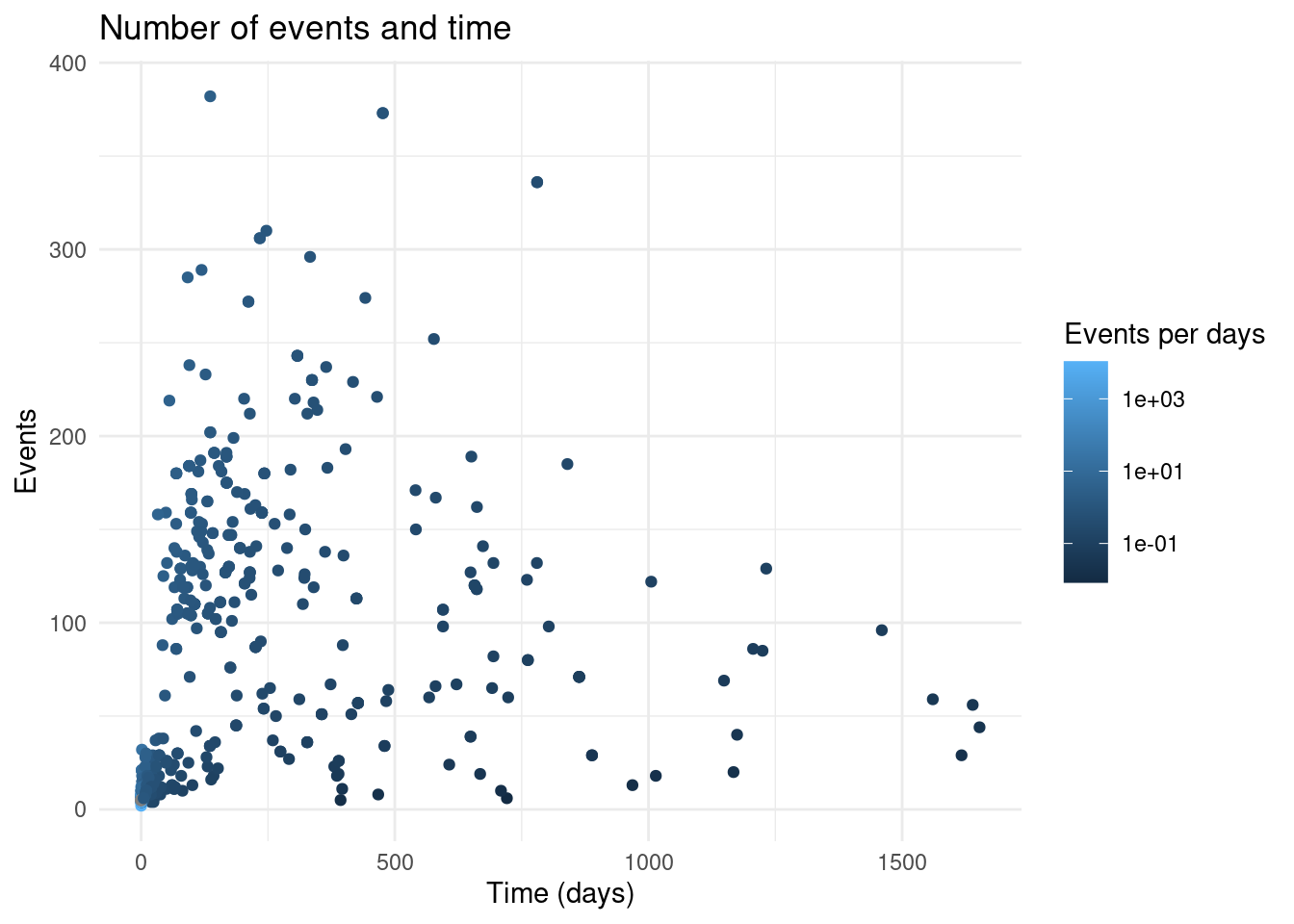
It is fairly similar to Bioconductor. We can see that issues have fewer events than on Bioconductor. This is because there isn’t any bot replying with each update to the repository neither a report of the build with every version increment.
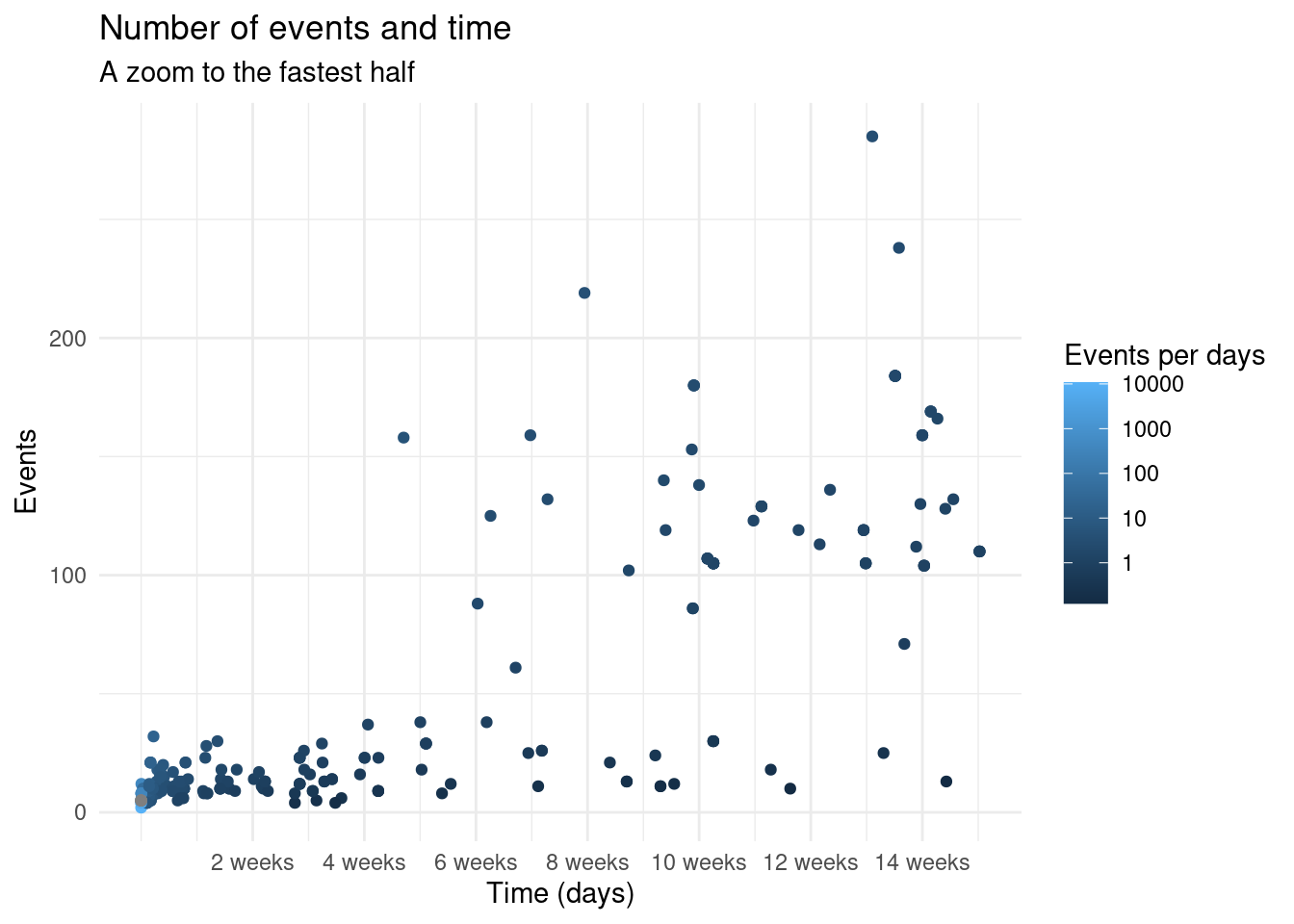
Most issues have all the events on the first weeks.
Editor
As mentioned the editor is assigned to find the reviewers and have the final decision on the package.
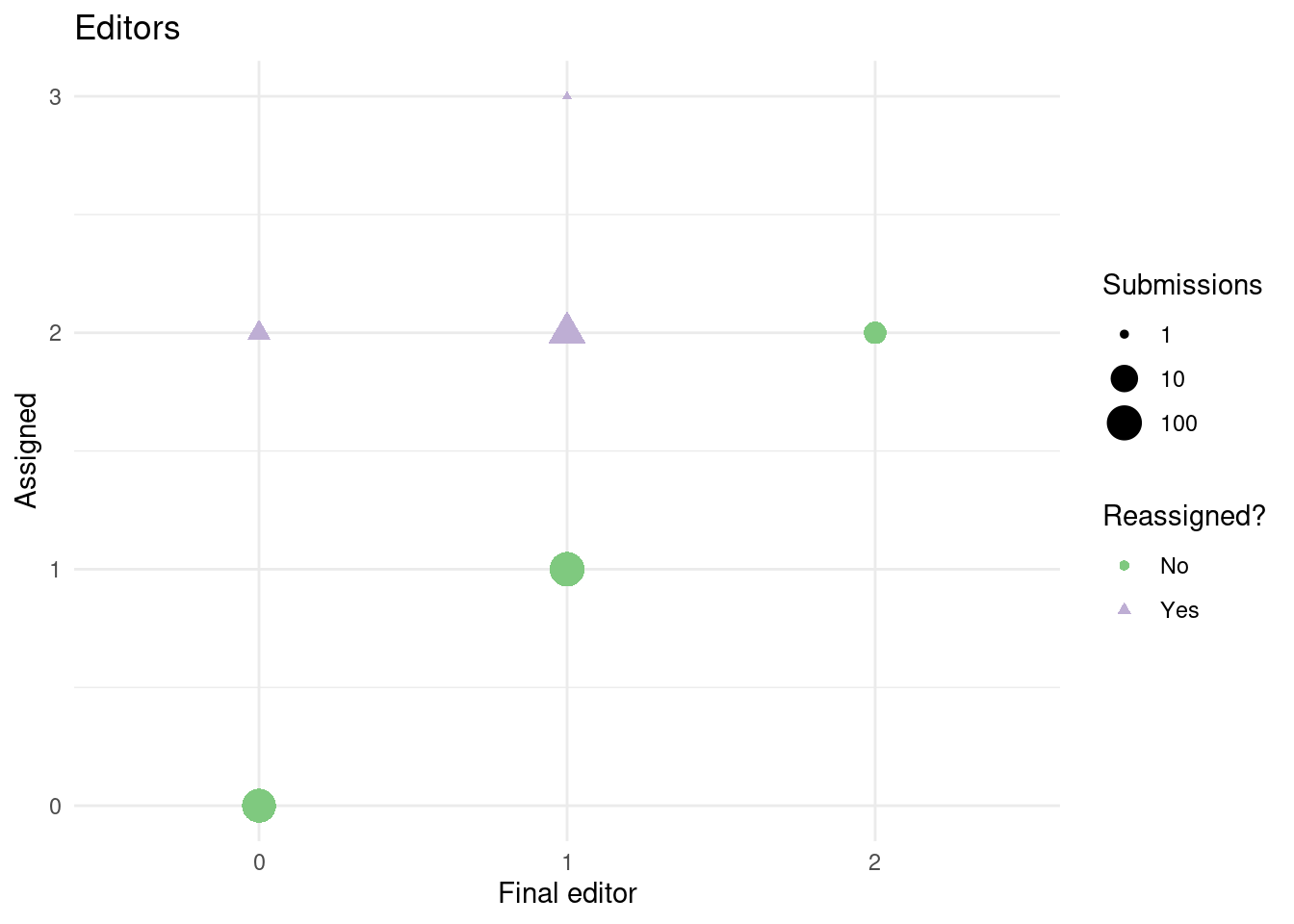
There seem to be few assigned users, and in some cases there are like two users assigned. This might be because the reviewers are also assigned that issue or something else.
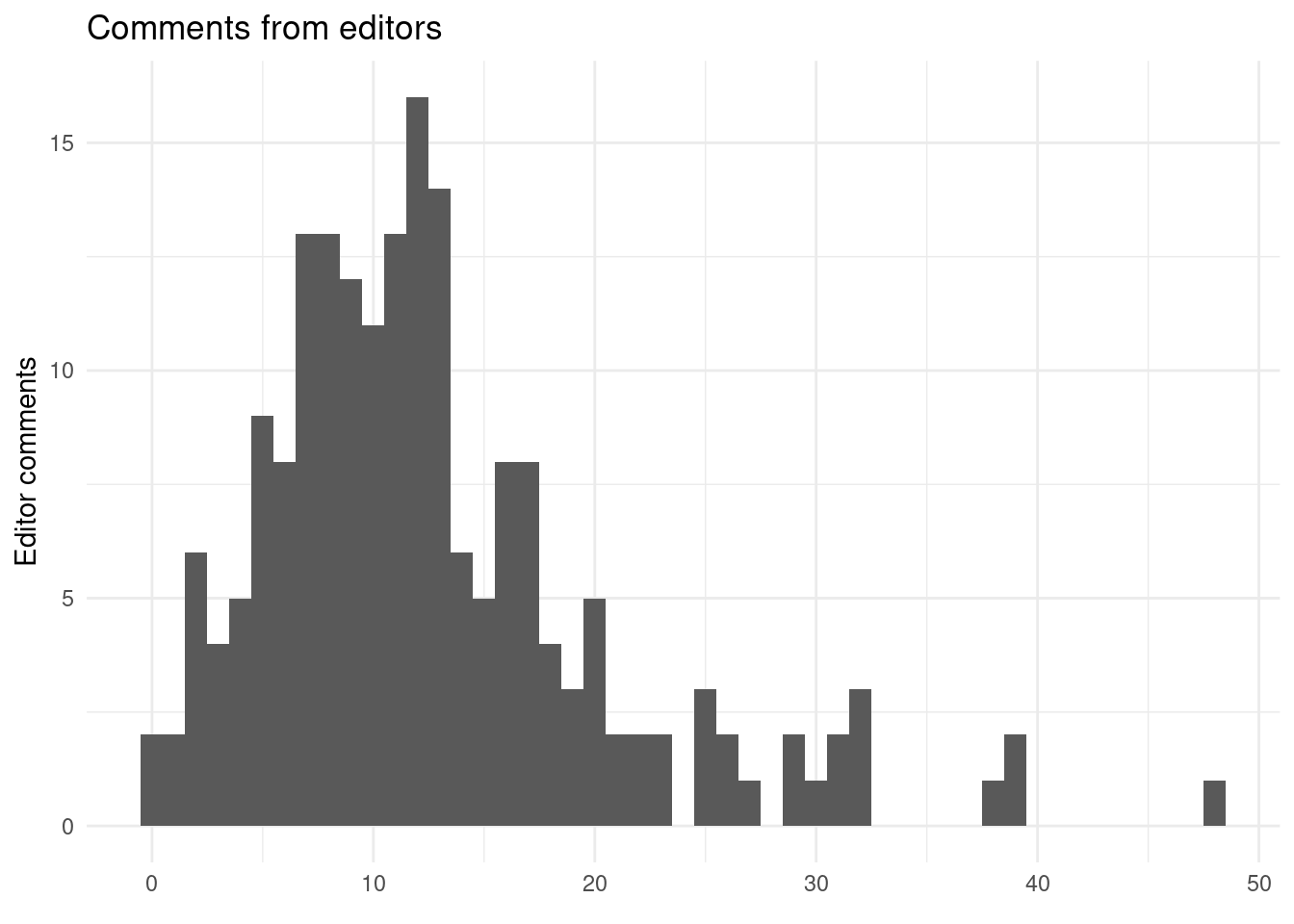
Editors are fairly more involved on the issues commenting around 11 times.
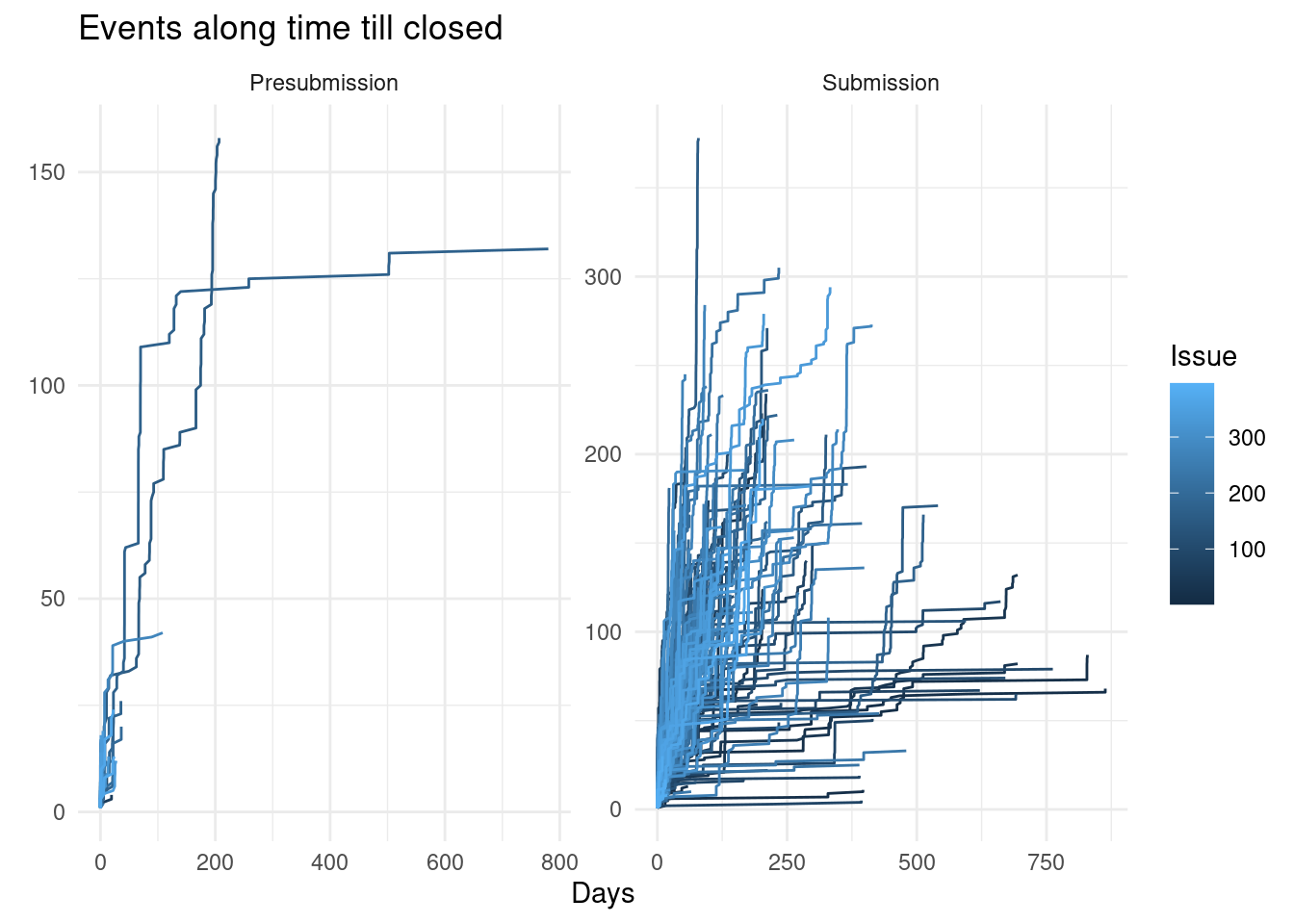
We can see that one presubmission issue took longer to decide than most of the submissions! In general submissions show the same behavior as in Bioconductor: Most of them have lots of events on a relatively short period of time. Some submissions take longer to close and remain without events for long periods of time.
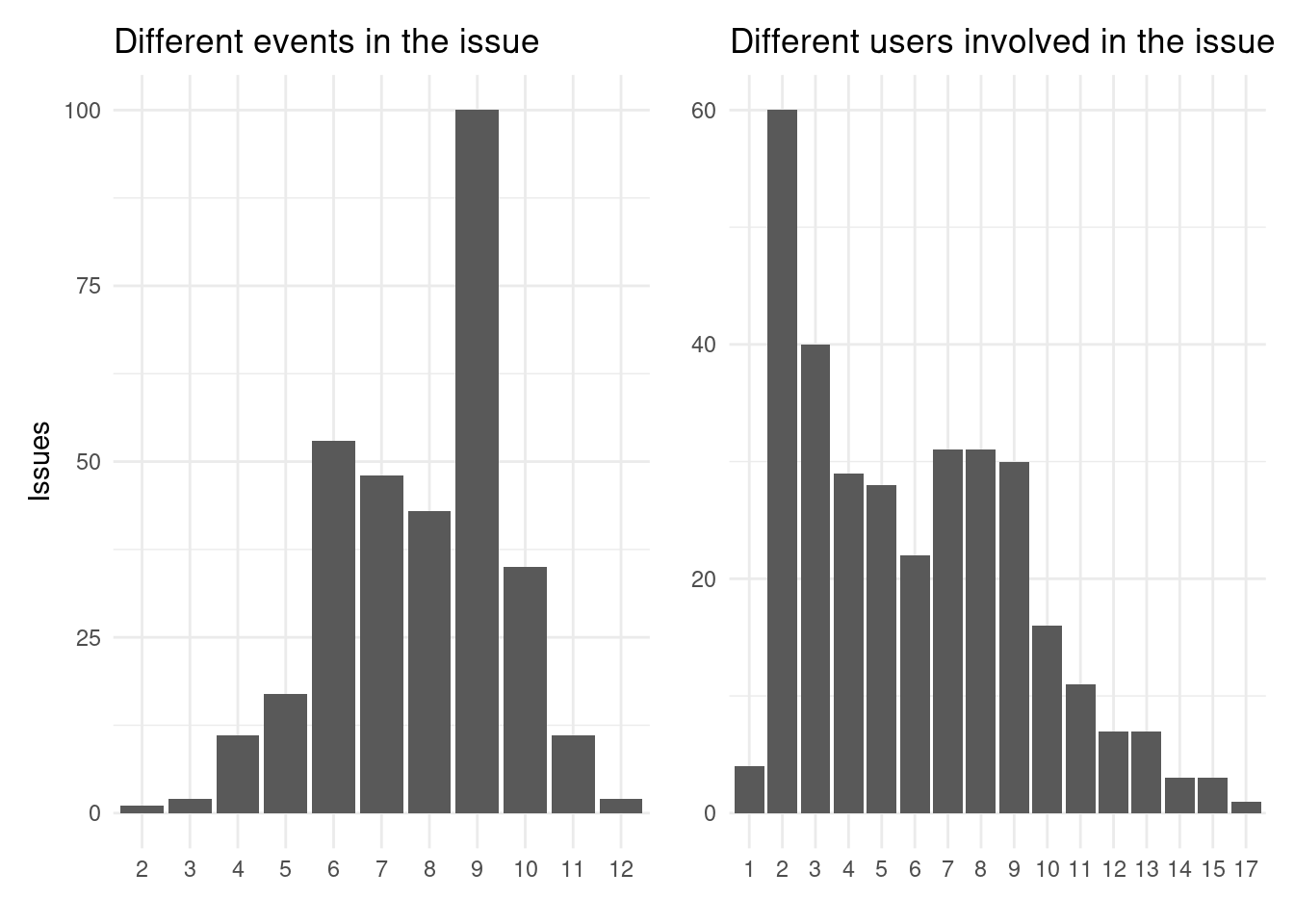
Here are some differences on the number of different events per issue and different users involved. There are more users and events involved with issues on rOpenSci than on Bioconductor. This is partially expected as the review are done by more people but I expected a similar pattern of events per issue.
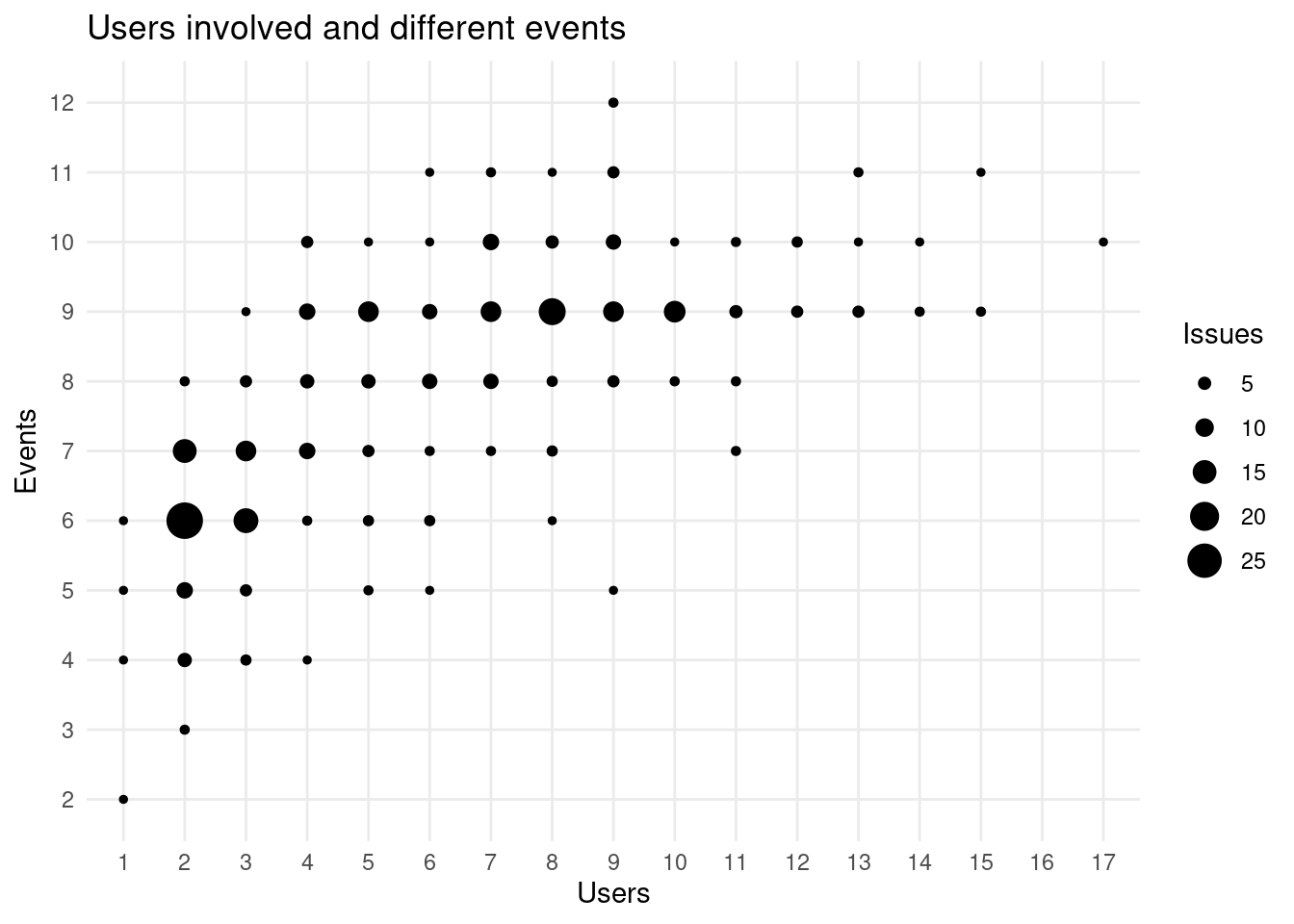
We can see that users and events are more distributed.
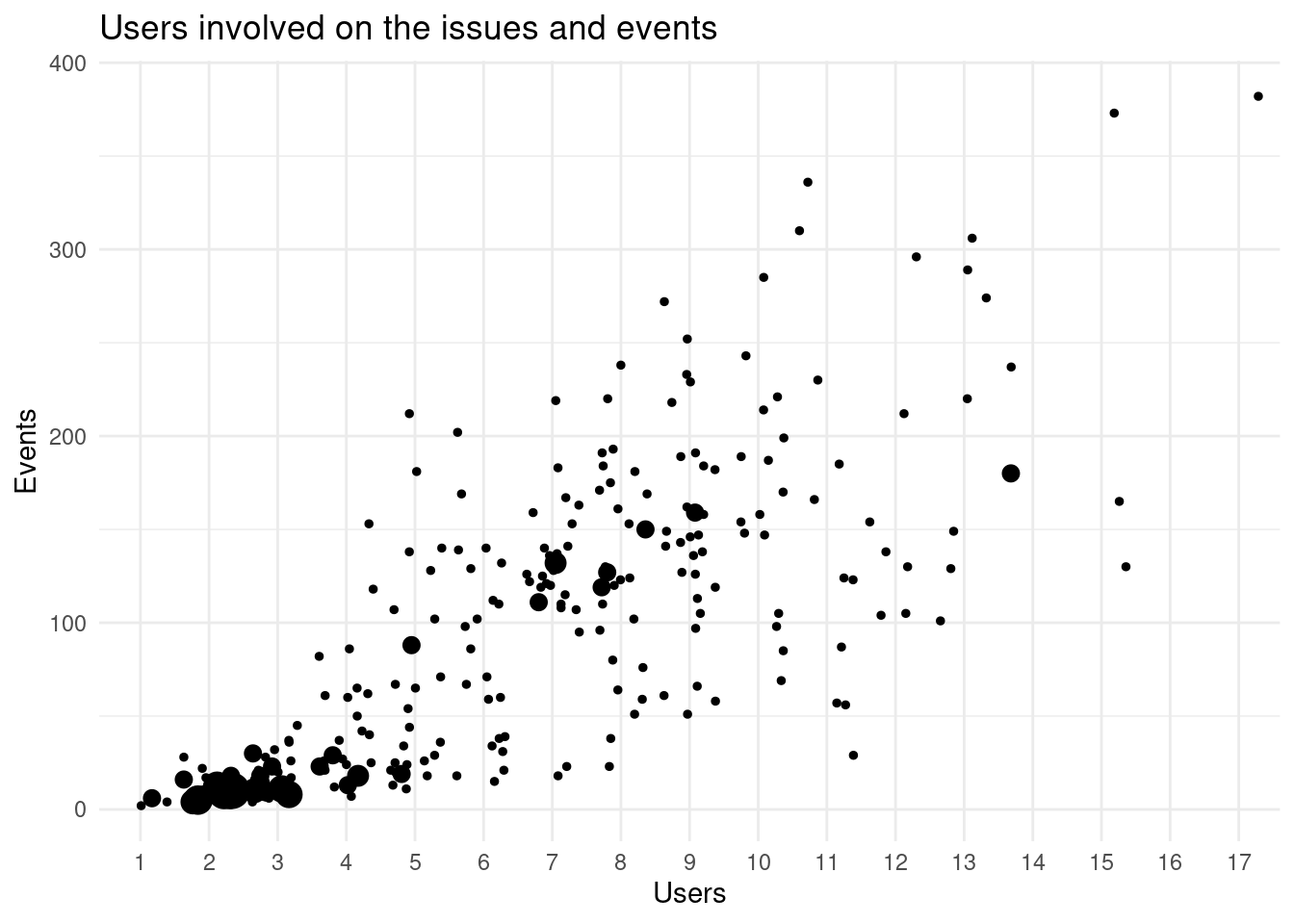
As in Bioconductor the more people involved more events per issue.
Who does each action ?
We can look now at who performs what, we know there are 522 participants:
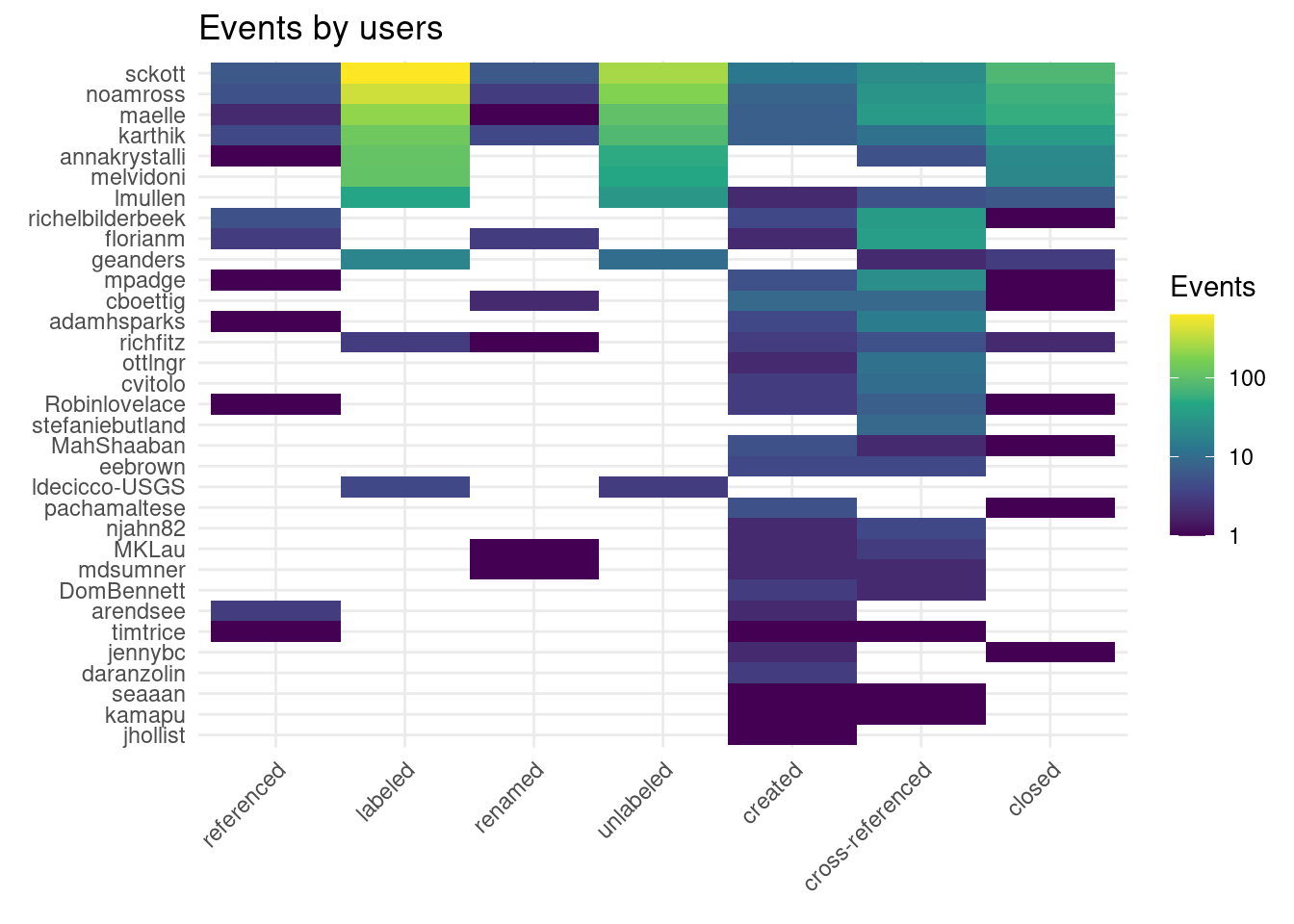
The top 35 people involved is dominated by editors. Surprisingly editors do also cross-reference other issues.
If we look at how many comments there are on each issue per author and editor we can get a sense of how much work it takes for editors:
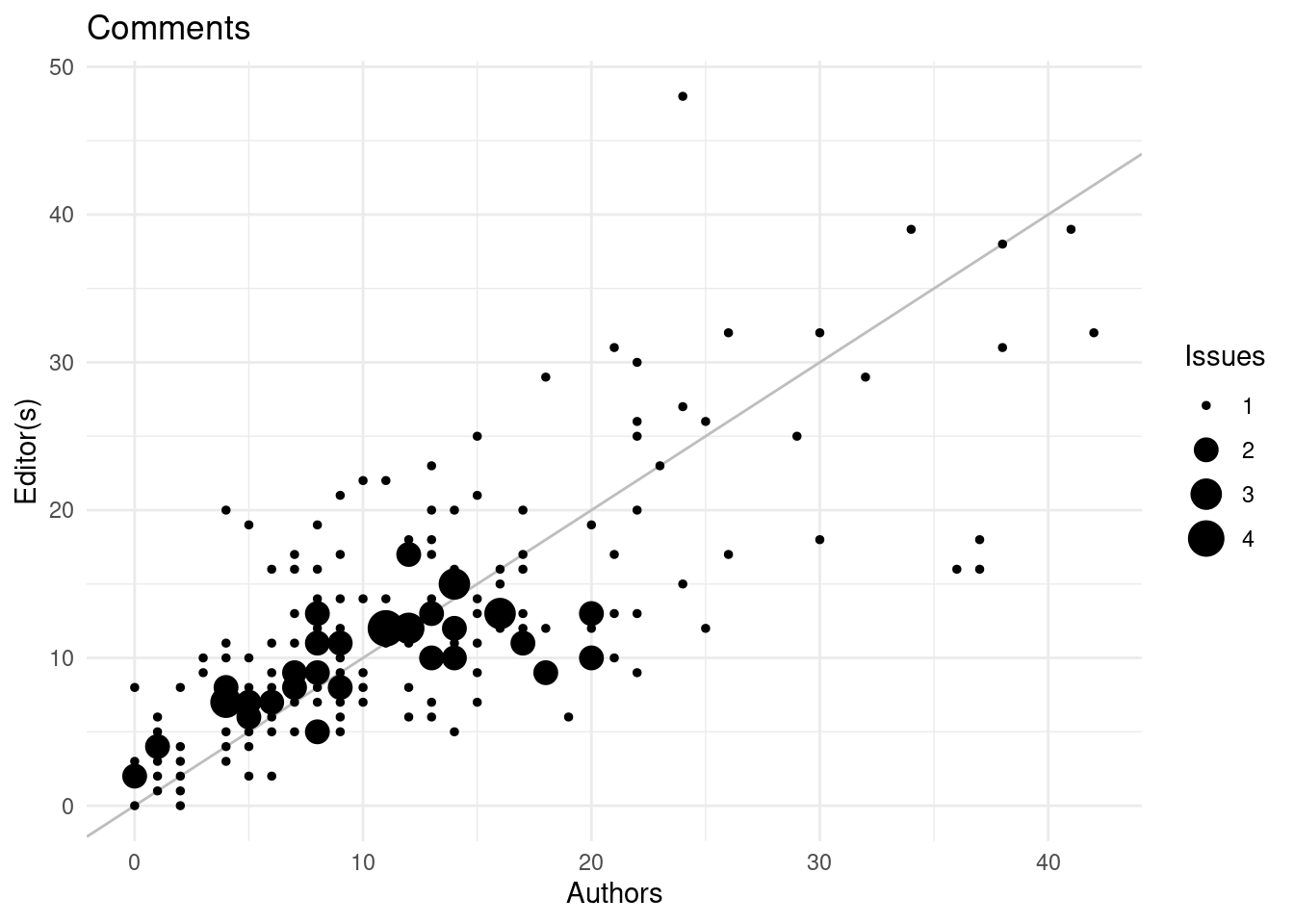
Here we can see that there are more comments from authors and editors.
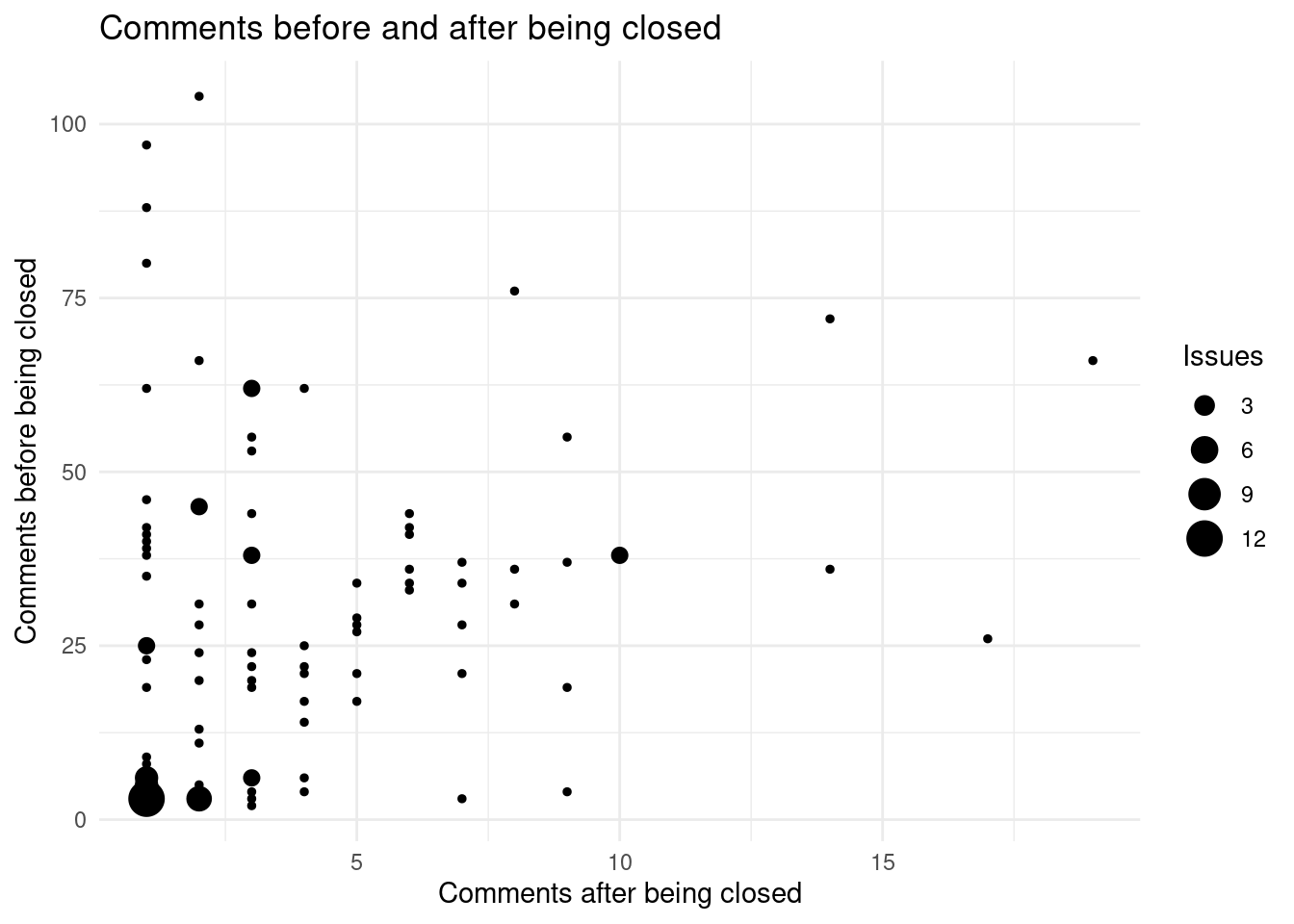
Some issues have fairly large number of comments after being closed. Perhaps discussing other alternatives or comparing to other existing software.
Mentions
There are many more mentions than on Bioconductor. So what do these people do when added to the conversation ?
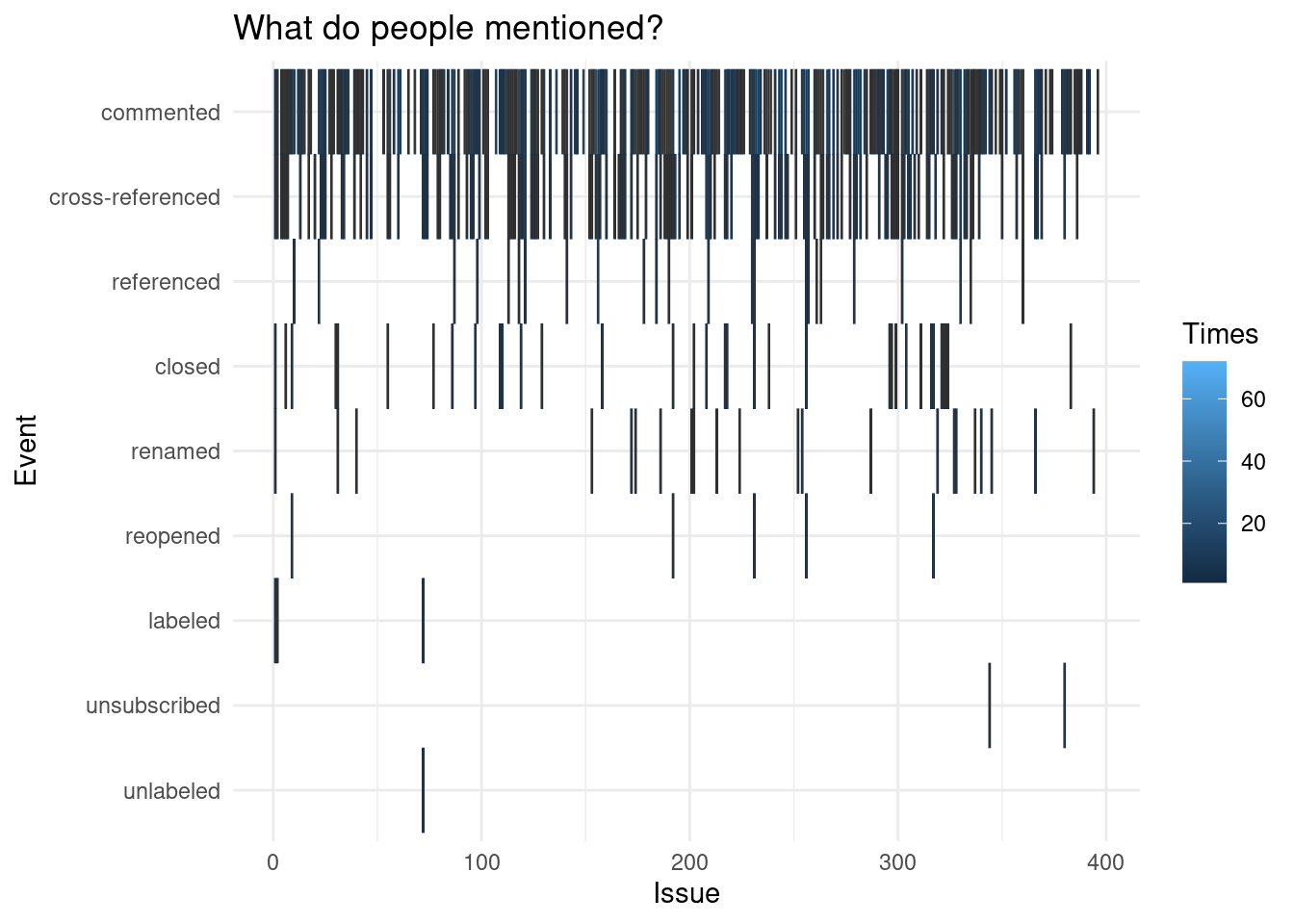
People mentioned bring their experience by commenting, and cross-referencing some other issues.
Labels
rOpenSci uses labels much more than Bioconductor, with a total of 65 different labels. It also uses them to mark on which step of the review process each issue is. We can see that it got expanded with time, from initially just three labels to the current 6-7 labels:
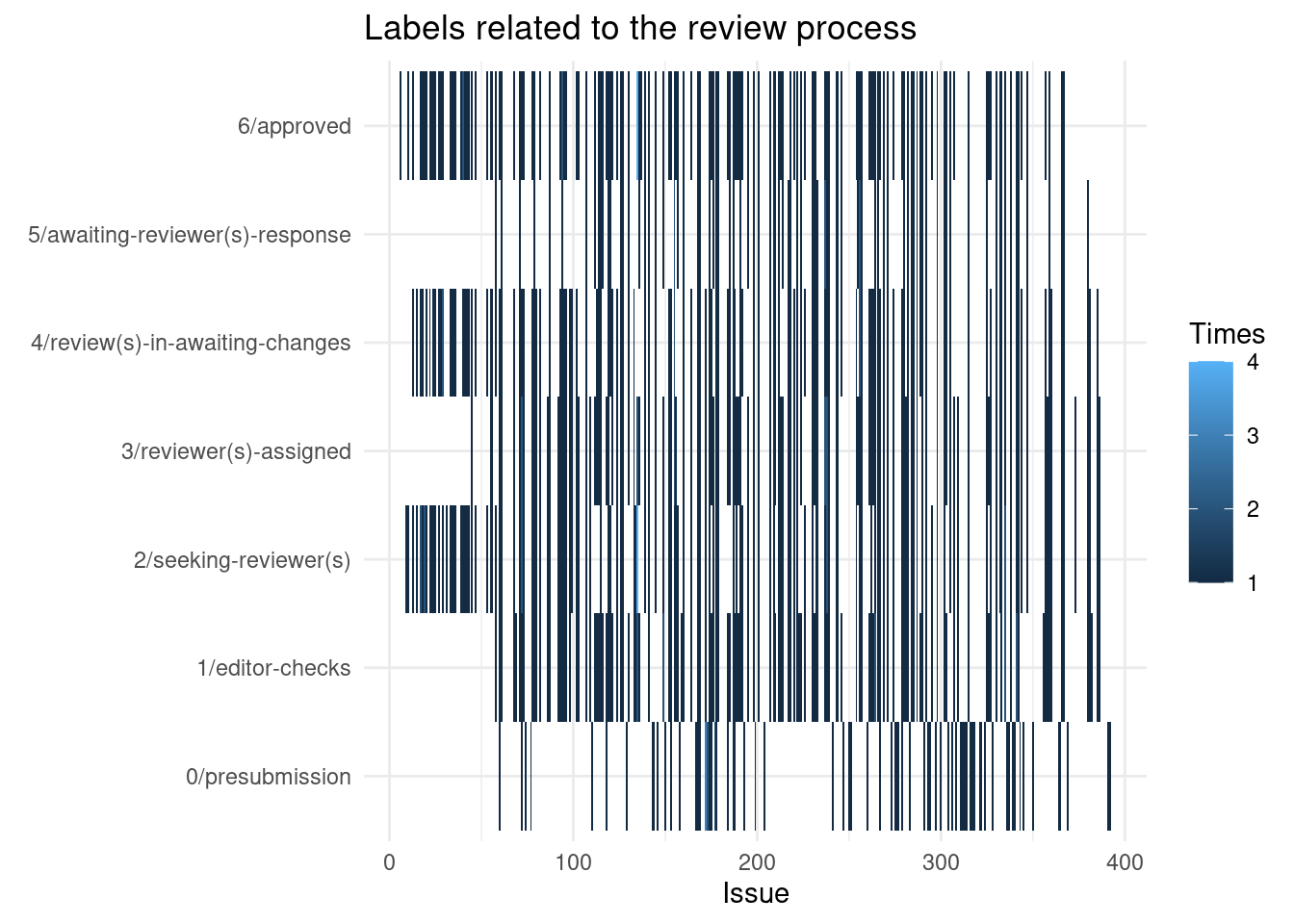
But labels are also used to indicate to which is the topic of each package:
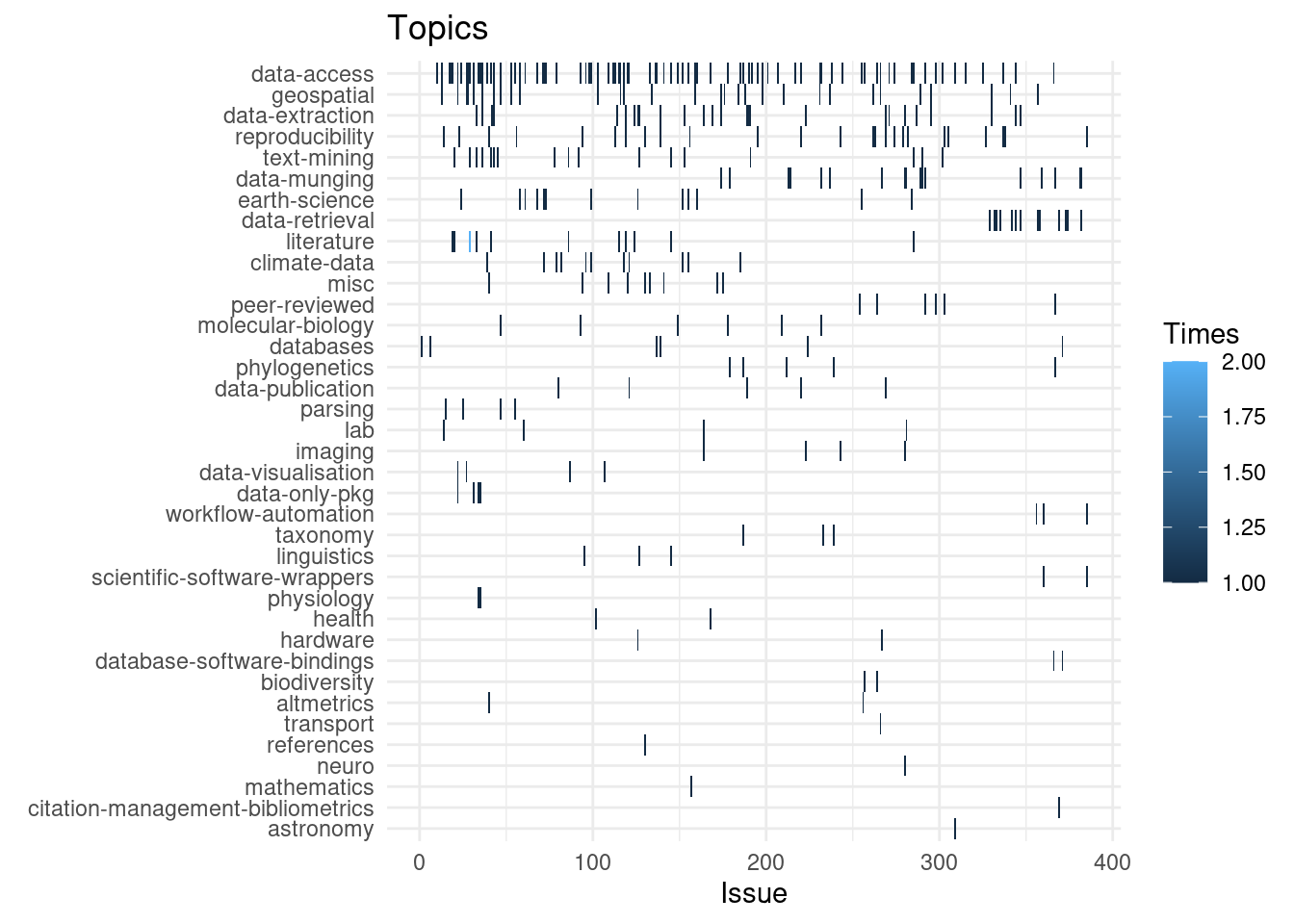
Surprisingly the focus seems to be on data-access followed by geospatial and data-extraction:
| Topic | n |
|---|---|
| data-access | 83 |
| geospatial | 30 |
| data-extraction | 26 |
| reproducibility | 25 |
| data-munging | 17 |
| text-mining | 17 |
| data-retrieval | 13 |
| earth-science | 13 |
| climate-data | 11 |
| literature | 11 |
Labels are also used to classify topics (and initially if it had an editor assigned)
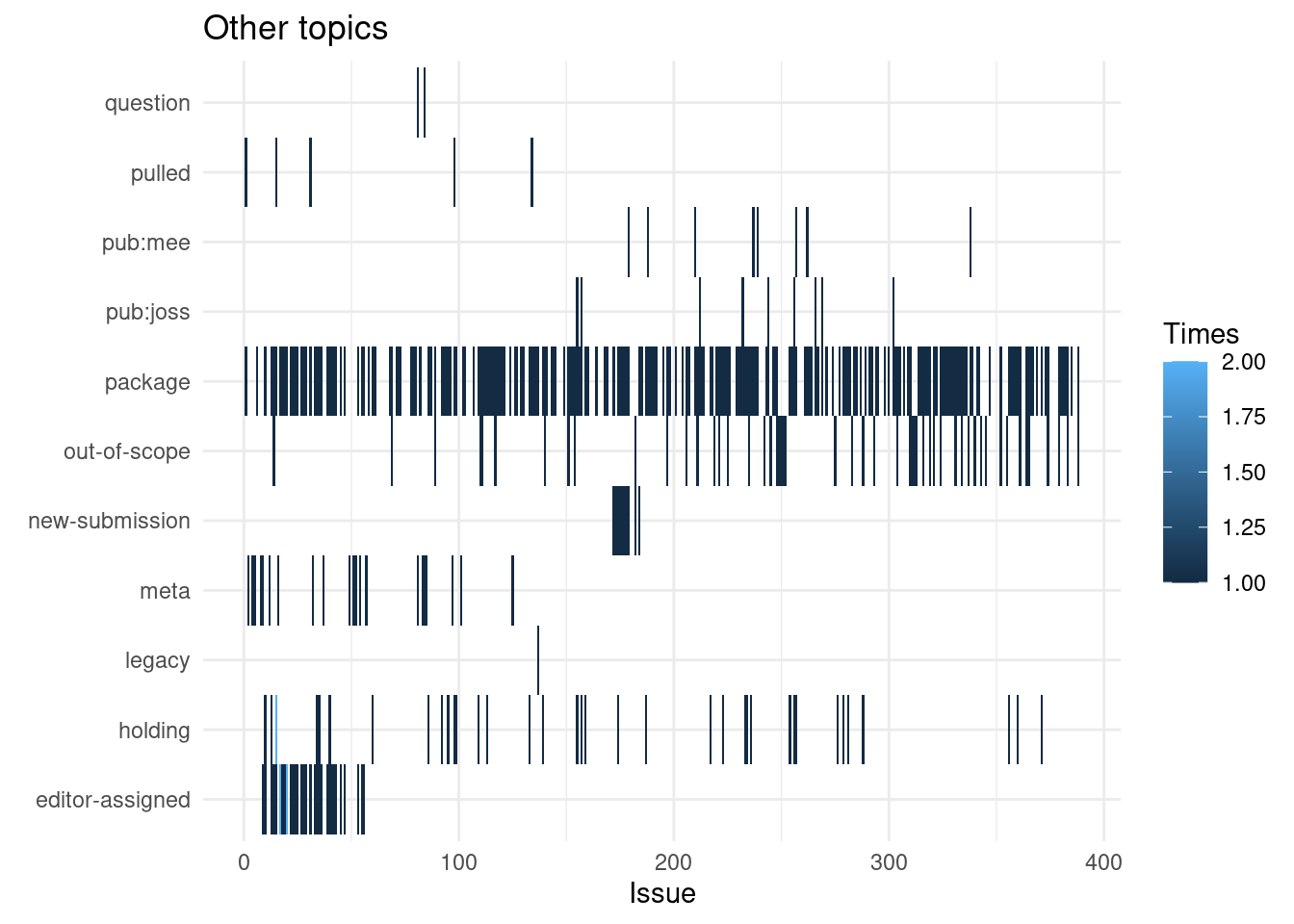
Other labels assigned, seem to be for packages or some other related to the process. Surprisingly there have been few submissions to MEE and JOSS according to the “pub:” labels.
Looking at the labels for each step can compute the median time required to get them:
| Step | Median days | Total days |
|---|---|---|
| 1/editor-checks | 2.1 | 2.1 |
| 2/seeking-reviewer(s) | 2.5 | 4.6 |
| 3/reviewer(s)-assigned | 10.8 | 15.4 |
| 4/review(s)-in-awaiting-changes | 26.0 | 41.4 |
| 5/awaiting-reviewer(s)-response | 30.5 | 71.9 |
| 6/approved | 17.0 | 88.9 |
We see that the slowest step is awaiting reviewers response, right after awaiting changes from the authors. According to this the review process is long and it takes around 3 months to get a package approved. However, if we look for each issue how much time does it take to get the next label we see another picture:
| name | Median days | Total days |
|---|---|---|
| 1/editor-checks | 2.1 | 2.1 |
| 2/seeking-reviewer(s) | 1.9 | 4.0 |
| 3/reviewer(s)-assigned | 6.4 | 10.4 |
| 4/review(s)-in-awaiting-changes | 25.0 | 35.4 |
| 5/awaiting-reviewer(s)-response | 17.1 | 52.5 |
| 6/approved | 12.2 | 64.7 |
Now the longest step is changing the packages with the feedback from the reviewers, followed by awaiting the reviewers comments but that is almost half of the time it was. The other times do not change much. The total time is still around 2 months, which is the double of what it takes to get a package accepted in Bioconductor.
Conclusions
Following the steps/labels the review process is similar enough to be able to compare the review process of Bioconductor and rOpenSci. Not having information about the build and check status of packages makes harder to compare some steps and the stage of the package upon submission. On some early submissions it was editor’s duties to review the packages like in Bioconductor. It was later abandoned in favor of two external reviewers. The reviews on the rOpenSci are handled by more people which makes submission to take longer (probably also because usually there are two reviewers) and because there might be a clarification of changes and a dialog after the first review.
In general it takes longer to get the packages approved than on Bioconductor.
Reproducibility
## ─ Session info ───────────────────────────────────────────────────────────────────────────────────────────────────────
## setting value
## version R version 4.0.1 (2020-06-06)
## os Ubuntu 20.04.1 LTS
## system x86_64, linux-gnu
## ui X11
## language (EN)
## collate en_US.UTF-8
## ctype en_US.UTF-8
## tz Europe/Madrid
## date 2020-10-26
##
## ─ Packages ───────────────────────────────────────────────────────────────────────────────────────────────────────────
## package * version date lib source
## assertthat 0.2.1 2019-03-21 [1] CRAN (R 4.0.1)
## backports 1.1.10 2020-09-15 [1] CRAN (R 4.0.1)
## blob 1.2.1 2020-01-20 [1] CRAN (R 4.0.1)
## blogdown 0.21 2020-10-11 [1] CRAN (R 4.0.1)
## bookdown 0.21 2020-10-13 [1] CRAN (R 4.0.1)
## broom 0.7.2 2020-10-20 [1] CRAN (R 4.0.1)
## cellranger 1.1.0 2016-07-27 [1] CRAN (R 4.0.1)
## cli 2.1.0 2020-10-12 [1] CRAN (R 4.0.1)
## colorspace 1.4-1 2019-03-18 [1] CRAN (R 4.0.1)
## crayon 1.3.4 2017-09-16 [1] CRAN (R 4.0.1)
## DBI 1.1.0 2019-12-15 [1] CRAN (R 4.0.1)
## dbplyr 1.4.4 2020-05-27 [1] CRAN (R 4.0.1)
## digest 0.6.26 2020-10-17 [1] CRAN (R 4.0.1)
## dplyr * 1.0.2 2020-08-18 [1] CRAN (R 4.0.1)
## ellipsis 0.3.1 2020-05-15 [1] CRAN (R 4.0.1)
## evaluate 0.14 2019-05-28 [1] CRAN (R 4.0.1)
## fansi 0.4.1 2020-01-08 [1] CRAN (R 4.0.1)
## farver 2.0.3 2020-01-16 [1] CRAN (R 4.0.1)
## forcats * 0.5.0 2020-03-01 [1] CRAN (R 4.0.1)
## fs 1.5.0 2020-07-31 [1] CRAN (R 4.0.1)
## generics 0.0.2 2018-11-29 [1] CRAN (R 4.0.1)
## ggplot2 * 3.3.2 2020-06-19 [1] CRAN (R 4.0.1)
## ggrepel * 0.8.2 2020-03-08 [1] CRAN (R 4.0.1)
## glue 1.4.2 2020-08-27 [1] CRAN (R 4.0.1)
## gtable 0.3.0 2019-03-25 [1] CRAN (R 4.0.1)
## haven 2.3.1 2020-06-01 [1] CRAN (R 4.0.1)
## here 0.1 2017-05-28 [1] CRAN (R 4.0.1)
## highr 0.8 2019-03-20 [1] CRAN (R 4.0.1)
## hms 0.5.3 2020-01-08 [1] CRAN (R 4.0.1)
## htmltools 0.5.0 2020-06-16 [1] CRAN (R 4.0.1)
## httr 1.4.2 2020-07-20 [1] CRAN (R 4.0.1)
## jsonlite 1.7.1 2020-09-07 [1] CRAN (R 4.0.1)
## knitr 1.30 2020-09-22 [1] CRAN (R 4.0.1)
## labeling 0.4.2 2020-10-20 [1] CRAN (R 4.0.1)
## lifecycle 0.2.0 2020-03-06 [1] CRAN (R 4.0.1)
## lubridate 1.7.9 2020-06-08 [1] CRAN (R 4.0.1)
## magrittr 1.5.0.9000 2020-08-21 [1] Github (tidyverse/magrittr@1d0559d)
## modelr 0.1.8 2020-05-19 [1] CRAN (R 4.0.1)
## munsell 0.5.0 2018-06-12 [1] CRAN (R 4.0.1)
## patchwork * 1.0.1 2020-06-22 [1] CRAN (R 4.0.1)
## pillar 1.4.6 2020-07-10 [1] CRAN (R 4.0.1)
## pkgconfig 2.0.3 2019-09-22 [1] CRAN (R 4.0.1)
## purrr * 0.3.4 2020-04-17 [1] CRAN (R 4.0.1)
## R6 2.4.1 2019-11-12 [1] CRAN (R 4.0.1)
## RColorBrewer 1.1-2 2014-12-07 [1] CRAN (R 4.0.1)
## Rcpp 1.0.5 2020-07-06 [1] CRAN (R 4.0.1)
## readr * 1.4.0 2020-10-05 [1] CRAN (R 4.0.1)
## readxl 1.3.1 2019-03-13 [1] CRAN (R 4.0.1)
## reprex 0.3.0 2019-05-16 [1] CRAN (R 4.0.1)
## rlang 0.4.8 2020-10-08 [1] CRAN (R 4.0.1)
## rmarkdown 2.5 2020-10-21 [1] CRAN (R 4.0.1)
## rprojroot 1.3-2 2018-01-03 [1] CRAN (R 4.0.1)
## rstudioapi 0.11 2020-02-07 [1] CRAN (R 4.0.1)
## rvest 0.3.6 2020-07-25 [1] CRAN (R 4.0.1)
## scales 1.1.1 2020-05-11 [1] CRAN (R 4.0.1)
## sessioninfo 1.1.1 2018-11-05 [1] CRAN (R 4.0.1)
## stringi 1.5.3 2020-09-09 [1] CRAN (R 4.0.1)
## stringr * 1.4.0 2019-02-10 [1] CRAN (R 4.0.1)
## tibble * 3.0.4 2020-10-12 [1] CRAN (R 4.0.1)
## tidyr * 1.1.2 2020-08-27 [1] CRAN (R 4.0.1)
## tidyselect 1.1.0 2020-05-11 [1] CRAN (R 4.0.1)
## tidyverse * 1.3.0 2019-11-21 [1] CRAN (R 4.0.1)
## vctrs 0.3.4 2020-08-29 [1] CRAN (R 4.0.1)
## viridisLite 0.3.0 2018-02-01 [1] CRAN (R 4.0.1)
## withr 2.3.0 2020-09-22 [1] CRAN (R 4.0.1)
## xfun 0.18 2020-09-29 [1] CRAN (R 4.0.1)
## xml2 1.3.2 2020-04-23 [1] CRAN (R 4.0.1)
## yaml 2.2.1 2020-02-01 [1] CRAN (R 4.0.1)
##
## [1] /home/lluis/bin/R/4.0.1/lib/R/library